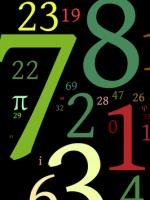 Radio Lab recently produced a short about people’s favorite numbers, For the Love of Numbers. It’s interesting because it had never occurred to me to have a favorite number. In fact, it seems like one of the stupidest things I’ve ever heard of. It’s kind of like astrology or something. And indeed, the reasons people gave for having their favorite numbers were generally stupid. For example, one said, “Four is my favorite number because I won a swim meet while racing in lane four.” Actually, that’s one of the more rational choices. Other people liked the way numbers looked. It’s quite a fascinating show and well worth listening to.
Radio Lab recently produced a short about people’s favorite numbers, For the Love of Numbers. It’s interesting because it had never occurred to me to have a favorite number. In fact, it seems like one of the stupidest things I’ve ever heard of. It’s kind of like astrology or something. And indeed, the reasons people gave for having their favorite numbers were generally stupid. For example, one said, “Four is my favorite number because I won a swim meet while racing in lane four.” Actually, that’s one of the more rational choices. Other people liked the way numbers looked. It’s quite a fascinating show and well worth listening to.
I want to tell you about my relationship with numbers—or rather whole numbers: 0, 1, 2, 3… Because my mind is a little crazy about them. If any of this leaked out in my regular life, I would probably be in an institution somewhere, or at least on powerful drugs. All the numbers to me are like characters in a play. This actually goes far beyond numbers. My entire understanding of the highest levels of math is littered with stories about this or that function and how it gets along with other functions. But let’s just stick with numbers.
Zero is like God. When combined with other numbers it doesn’t do a thing: 0 + you = you. But it has the power, if you embrace it, to consume you: 0 × you = 0. And since it is infinite, it does not grow or shrink. This goes along with the reciprocal of 0 being infinity. Of course, contrary to what many people think, infinity is not a number, so 0 is the only infinite number. So like God it is infinite, generally irrelevant, and infinitely powerful.
One is like air. You don’t even know its there, but it is always there. I don’t like it. It seems smug to me. One is what makes a couple a crowd. It can do some interesting things. Most especially, it can fix prime numbers—I’ll get to them in a moment. But if you interact with it, nothing happens. One can be invited to a party, but you can’t love it because it disappears. It’s almost not a number at all, although conceptually it has amazing powers. Still, standing there along on the page, I want to slap it.
Two is a very troublesome number. I want to like 2. I have a fondness for even numbers for the same reason I hate prime numbers. Even numbers are communal. They are a marriage of two or more numbers. The number 256 is a polygamous same-sex marriage of 2s! But what are these 2s anyway? I find it highly upsetting that 2 is both an even number and a prime number. (If you think this article is a bit tongue-in-cheek, you are right; but I’m dead serious about this one.) This is an issue that has bothered me since I was about six-years-old. It is the one thing in the universe that I find most out of balance. And thus, I feel very much like the paradox of the universe is hiding in this contradiction. As a result, I don’t like the number 2. It taunts me.
The rest of the numbers have their own narratives. Three is the first uncomplicated prime number. And as I said, I don’t like prime numbers because they aren’t bound together with other numbers. I’m more forgiving of 3 and 5 and 7 than I am, say, 11, 13, and especially 17. Good lord, if 117 isn’t a prime (3×3×13), why is 17?! And it only gets worse. The number 611,953 is a prime number. Doesn’t that seem like the Howard Hughes of numbers: having so much to share and yet sharing nothing? No. Well it does to me!
I could go on. There are numbers I rather like. I’m fond of numbers that reduce to a diverse set of prime numbers. The number 2,310 is 2×3×5×7×11. What a wonderful family that is! Or double it, because they had twins: 4,620. Six is also an interesting number, because it combines three troublesome small numbers: 3×2×1. You know they have problems, though. They probably run a meth lab out of trailer in the backyard. But still, an interesting family.
The most common favorite number is 7. One mathematician on the show posits that this is because it is the only number in the first 10 that doesn’t multiply or divide within that group. You can divide 10 by 5 and get 2. You can multiply 3 by 2 and get 6. But you can’t divide 7 by anything and multiplying it by even 2 puts it outside the 1-10 range. I doubt there is anything to that. But regardless, this just makes me think that 7, as I’ve long believed, is a troublesome number. It doesn’t get along with the other numbers. Why would anyone like such a number?
Of course, for most people, numbers represent things. One is the loneliest number (although I’d argue that 0 is the loneliest number—think about that the next time you pray to God) and 2 is not, as long as you’ve picked the right mate. I see it all about how the numbers interact. For me, it is a question of arrested development. When I was in grammar school, I enjoyed reducing numbers to their primes. It annoyed me when I came face to face with a bunch of primes. It seemed like I ought to have been able to go further. The teachers didn’t care. They didn’t even understand. But I think Euclid would have.
Prime numbers are like Heisenberg’s Uncertainty Principle, but much more fundamental. Beyond them you would find God, but you can’t go beyond them. They are the most basic residue of God. Yet most religious people look for God in ancient poetry. It seems odd. The closest you can get to God is through math. And if that leads to any kind of theology, it leads to pantheism: you plus God is God; you times God is God. My take away: you don’t matter but also: God doesn’t matter.
But if you like the number 8 because it is looks nice, you are probably happier than I am.





